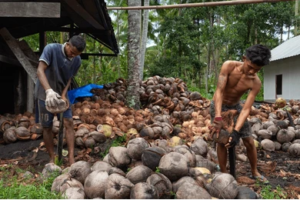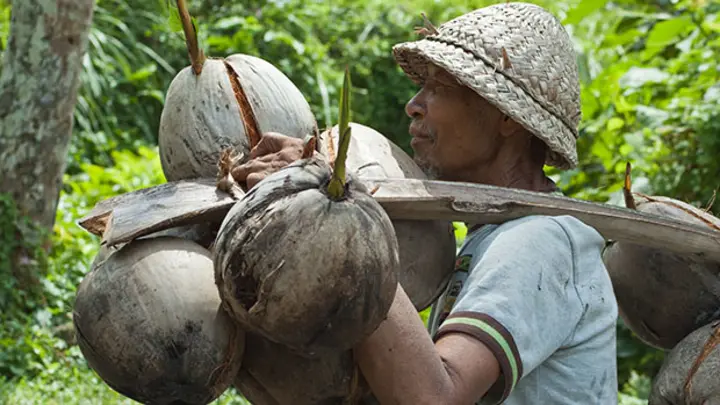The Hardships of Coconut Farmers
In the coconut groves, countless coconut farmer endure a demanding lifestyle. Notably, this way of life has remained unchanged for generations.
Born into a legacy of coconut farming, many residents follow the paths of their ancestors. They scale tree trunks with machetes to gather coconuts.

coconut peeling or removing of coconut husk
As a result, this cycle of inherited labor is a familiar story. The main way to make a living involves harvesting coconuts, extracting their meat, and converting them into oil and juice.
It’s an arduous job, done six days a week in the harsh tropical climate. Consequently, farmers earn around 60,000 pesos a year (about $1,100).
Their income fluctuates with the global price of coconut oil, which is heavily influenced by international traders. “We are poor here,” one farmer comments.
As rain turns the soil to mud, he continues, “We buy only sardines and rice. For most people here, the life they are born into is the life they will lead.”
Life in this community centers around two main activities: playing basketball, a beloved pastime, and running copra cooperatives. These cooperatives allow local farmers to combine their efforts for better financial results.
Typically, coconut farmer harvest coconuts from small plots, remove the husks, and sell the coconuts to agents for juice processing.
Meanwhile, the remaining crop is dried over open coals at village drying stations, creating copra. This is then sold to processing plants for oil extraction.
Interestingly, women often own and operate these drying stations. One woman, who also runs a grocery kiosk, teaches music, and performs with a family band at local events.
“I have a lot of side hustles,” she says, highlighting the need for multiple income sources in the community. The cooperative’s primary role is to coordinate the transportation of coconuts to processing plants.
However, this task has become increasingly challenging since the cooperative’s cargo truck broke down. It now sits unused, rusting under a tarp.
Unfortunately, the 150,000 pesos (about $2,600) needed for repairs is beyond the cooperative’s means, forcing them to rely on buyers’ agents. They charge for transportation—an added burden amid falling copra prices.
The community suspects that increased palm oil production from large producers in the Philippines, Malaysia, and Indonesia is driving prices down.
Despite these difficulties, the farmers remain stoic. They are acutely aware of their mortality as they extract a living from century-old trees that connect the earth and sky.
“This is the only resource that’s available here,” one farmer reflects. “The coconuts will still be here even after I pass away.”

